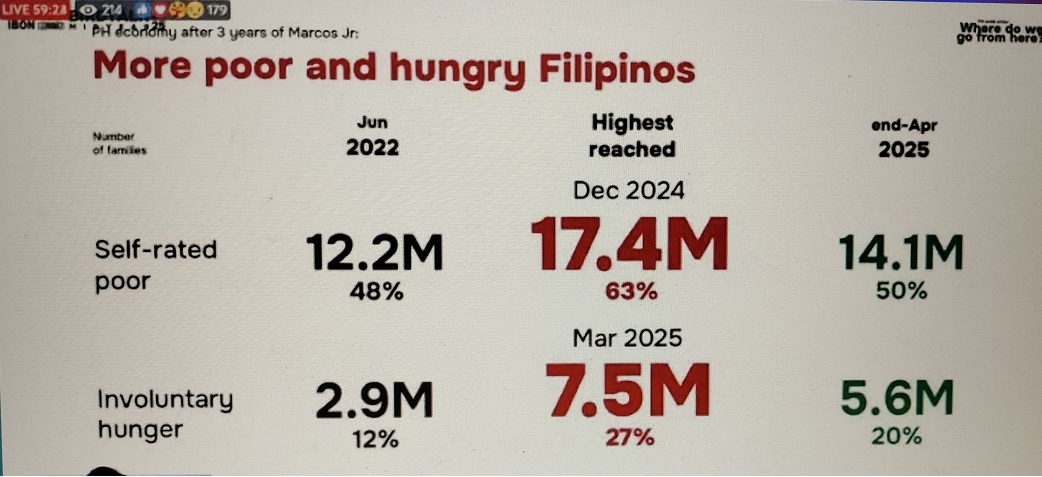Three years into Pres. Ferdinand Marcos Jr.’s administration, two questions hang in the air: How is the Philippine economy faring and how are Filipinos surviving? At the IBON BirdTalk Midyear 2025 held over Zoom on July 25, IBON executive director Jose Enrique “Sonny” Africa said there are more poor and hungry Filipinos despite the accomplishments Marcos enumerated in his 2024 State of the Nation Address. Africa was joined by IBON head of research Rosario Bella Guzman.
IBON BirdTalk is an economic and political briefing on the Philippine economy.
Earlier in January, at IBON Year Starter BirdTalk 2025, he said that things in the Philippines were not good and the country was not the star of Asia.
In this latest briefing, Africa presented figures on the self-rated poor and on involuntary hunger. The self-rated poor were pegged at 12.2 million (48%) in June 2022, which skyrocketed to 17.4 million (63%) in December 2024 — the highest it has reached, he said. It dropped to 14.1 million (50%) in April 2025, but it is still 2% higher than in 2022. Meanwhile, involuntary hunger was at 2.9 million (12%) in June 2022, increasing to 7.5 million (27%) in March 2025, and dropping to 5.6 million (20%) in April 2025, which is still higher than in 2022.
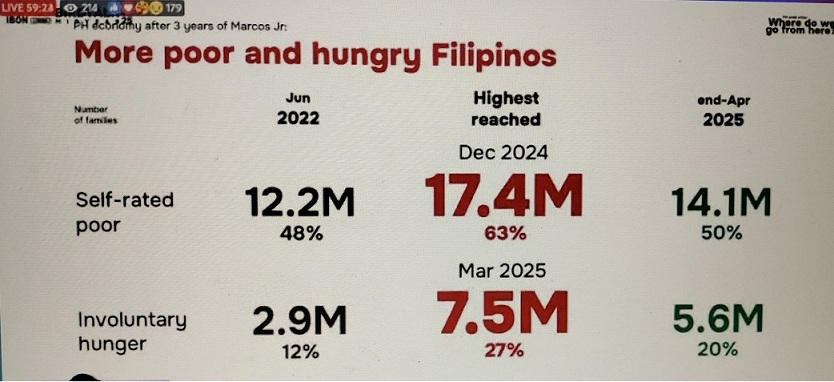
How does one make sense of the numbers? Africa drew two conclusions from IBON’s findings vis-á-vis the government’s achievements. First, he said, the micro solutions were too small for the magnitude of the problems at hand. Second, the policies did not fit the fundamental problems, which are “the deeper problem because the policies didn’t address industrialization and agrarian reform, and didn’t give Filipinos a chance to benefit from the policy programs.”
Africa’s slide on a comprehensive list of the Legislative Executive Development Advisory Council’s priority bills as of June 2024 mentioned, to name a few: Amendments to the Foreign Investors’ Long Term Lease Act, Amendments to the Electric Power Industry Reform Act, Reforms to Philippine Capital Markets, Amendments to the Rice Tariffication Law, Anti Agricultural Economic Sabotage Act, and Waste to Energy Bill.
Main problem
Africa contended that the Philippines’ dire situation is due to Marcos’ deprioritizing of the agricultural sector, which has resulted in grave consequences for the country. For one, it is in a perpetual state of agricultural backwardness and premature deindustrialization (“There’s no industrial maturity to begin with,” he said). For another, the manufacturing sector is down to the smallest share of GDP in 75 years and agriculture to the smallest in history.
Africa said the figures for the average quarterly agricultural growth were 0.2% under Marcos from Q3 of 2022 to Q1 of 2025, compared to 1.2% during Rodrigo Duterte’s term and 2.1% during Benigno Aquino III’s administration. The agricultural share of the General Appropriations Act (GAA) was 3.9% in 2025 versus 4.1% in 2024 and 3.5% in 2023. The GAA for micro, small and medium enterprises was only at 0.6% or ₱3.5 billion for 1.1 MSMES, with 5.6 million employed.
“There’s no Filipino industrialization policy. Instead, trade and investment liberalization unduly favor foreign investors without contributing to creating a Filipino industrial base,” Africa said.
Another contributing problem is the US-biased globalization — “protectionism at home, opening up abroad” — of the Philippines. Africa said the country still thinks foreign direct investment (FDI) is the “magic bullet” to banish economic woes when “FDI and exports have been and more than ever are a dead end for development, with the slowing of global trade/investment.” He added that global trade has been plateauing and global FDI falling since 2008-2009.
According to Africa, it is a myth that an open economy helps to develop the Philippine economy. He said decades of tariff cuts, FDI liberalization, and years of World Trade Organization agreements plus 12 Free Trade Agreements have only led to a steady decline in the manufacturing and agriculture sectors. In 1975, the decline in the two sectors was at 44.32%; it plunged drastically to 59% in 2024.
“Why tie our future to the US?” he said. “Filipinos are locked out of opportunities given the thinking that the US will save the country. Instead, there should be more protectionist measures than liberalization measures.”
US19% vs PH0%
Africa said the matter is made complicated with US President Donald Trump’s Liberation Day Tariff, which has America paying 0% for goods entering the Philippines while Philippine goods are taxed 19% upon entering the United States. Prior to this new tax deal, only 6.2% was levied on Philippine products exported to the US and 3.2% on US exports to the Philippines.
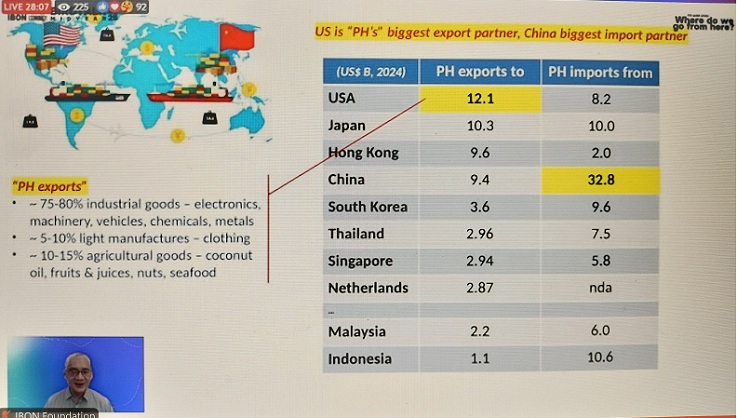
Why did Marcos et al. accept the one-sided agreement? Africa said it was due to the poor negotiation leverage and posture of the Philippine government, especially its “narrow-mindedness, with the trade negotiators convinced that trade will help us, which it hasn’t.”
Guzman shored up Africa’s statements, saying that Marcos has “self-interests” such as “his court cases in America.” And, she added, “the government has always bowed to the US.”
Africa said further opening the Philippines to the United States will see an influx of military equipment and agriculture products (soybean meal, wheat, dairy, pork, poultry, beef). He predicted the country’s becoming a site for the production of semiconductors (“cheap labor,” he said) and for the production and logistics of the “US-Philippine Defense Industrial Cooperation” — ship and aircraft maintenance and repair, logistics support, nickel mining and refining.
He summarized the revenue loss for the Philippines: ₱31 billion (all products), ₱1.6 billion (automobiles), ₱440 million (pharmaceuticals), ₱730 million (soy), and ₱1.2 billion (wheat).
Africa highlighted the case of electronics, the biggest Philippine export to the United States at 56% (or $6.107 million), saying these are not Filipino-made electronics but are assembled in the country for Manila-based US-owned companies then shipped to the US. He said this is advantageous for America because of the April 2025 Trump executive order exempting goods like pharmaceuticals, copper, semiconductors, etc. from “ad valorem rates of duty.”
“The US exempted the the US semiconductors in the Philippines because they want to develop their own conductor industry. They wouldn’t want to tax their own,” he said.
And the people?
Guzman said the Marcos Jr. presidency has been “a disaster of massive proportions” and “compromised the sovereignty of the country” with its alignment with the US.
“Policies are favorable to oligarchs,” she said. “The government has never achieved its growth targets/goals, yet the economic managers keep talking about resilience. Life is on a downward spiral, with Filipinos experiencing worsening poverty and hunger. Joblessness and falling incomes are the persistent realities.”
Guzman said she does not see any major changes in policy soon. She cited what she described as the “42% control of the government” by the political parties of the Filipino tycoon triumvirate of Ramon Ang, Enrique Razon, and Manny Villar. Ang is with the Nationalist People’s Coalition, Razon with the National Unity Party, and Villar with the Nacionalista Party.
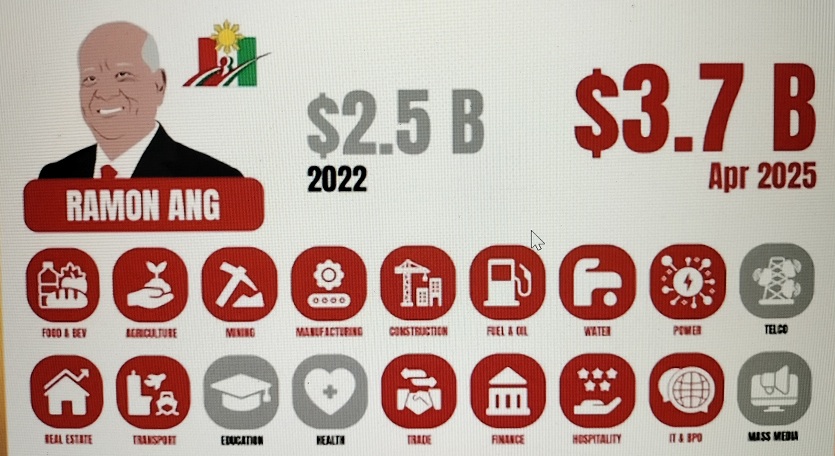
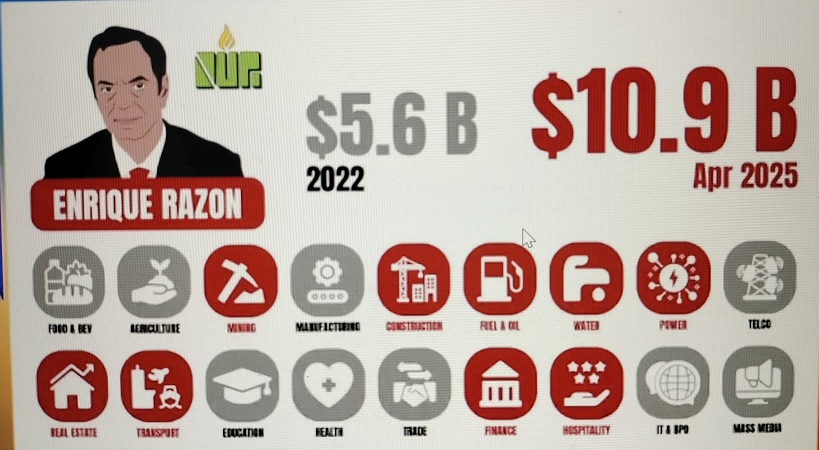
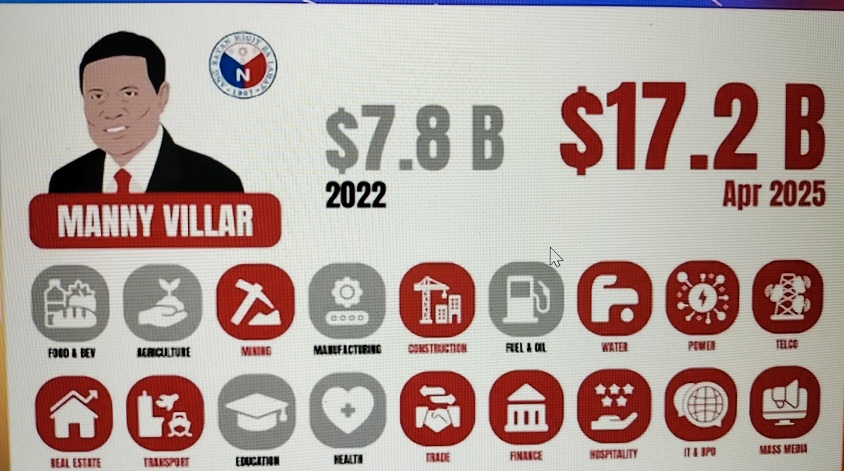
“What policies do you expect from them?” she said. “It’s a matter of who gets to rule and why politics is rotten to the core. Power still remains in the hands of the wealthy. What happens to the poor?”
As Guzman sees it, today’s neoliberal globalization policies and laws will perpetuate backward economic outcomes because these benefit only a few, and not the people. For instance, she said, tax cuts for corporate and investment incomes are at 20%. She added: Amendments to the remaining provisions of the Public Service Act, Foreign Investment Act, and Retail Trade Liberalization Act allow 100% ownership of telecoms, railways, shipping, expressways, and renewable energy. Tax holidays of seven years are only for mega projects, VAT exemptions are only for imported machinery and materials, and tariffs on imported rice, corn, and pork are lowered.
“The government’s economic policy thrusts are pro-capital, pro- rich, anti-poor and anti-development,” she pointed out.
Violations of human rights are another contributing factor to the Philippines’ woes, according to Guzman. Citing UN Special Rapporteur Irene Khan’s report, she said the Marcos administration is a serial violator of human rights. Using data as of March 2025 from the rights organization Karapatan, she cited the 745 political prisoners, including 160 arrested under the current administration; 15 National Democratic Front of the Philippines consultants and staff; 100 sickly; 148 women; and 106 elderly.
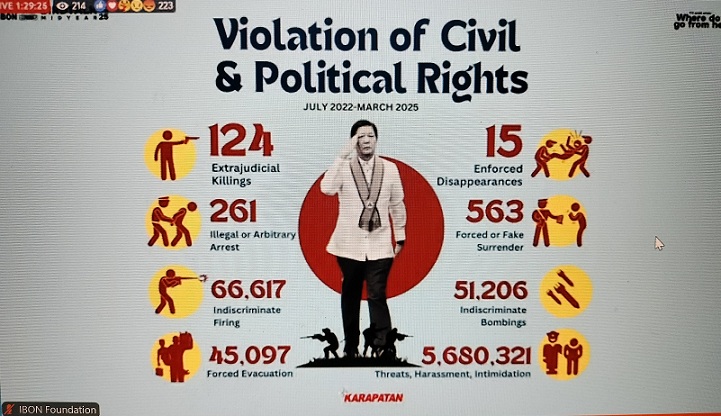
In terms of violation of civil and political rights, she referenced Karapatan data showing cases of 5,680, 321 threats, harassment, and intimidation; 15 forced disappearances; 261 illegal or arbitrary arrests; and 124 extrajudicial killings from July 2022 to March 2025.
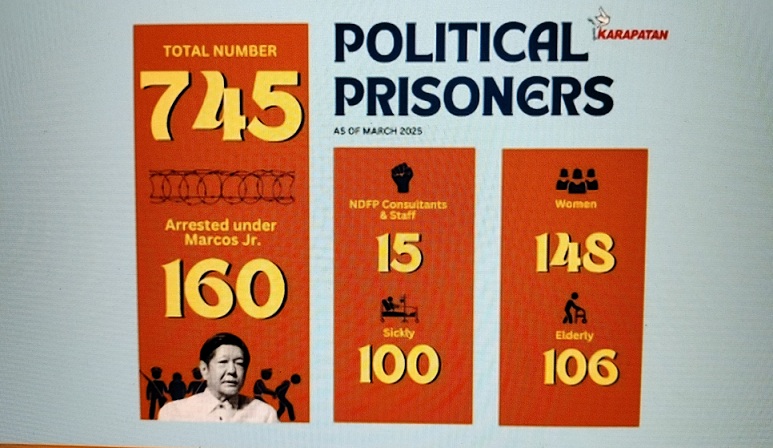
Growth rate
Guzman explained some crucial numbers beginning with the growth rate. The growth target in Q1 of 2025 was originally set at 5.9%, but was lowered to 5.5% in June. The numbers are telling: Q1 of 2022 got off to a good start at 8.1% but it dropped to 6.4% in 2023, then plunged to 5.9%in 2024, and finally nosedived to 5.4%.
Likewise, national government deficits were at record highs with a historic average of -2.8%, which drove up debts, Guzman said. She said the national debt of ₱16.92 trillion is part of the bag of problems, with every Filipino and Filipino family having now amassed debts of ₱150,199 and ₱619,719, respectively, to the World Bank and lending countries.
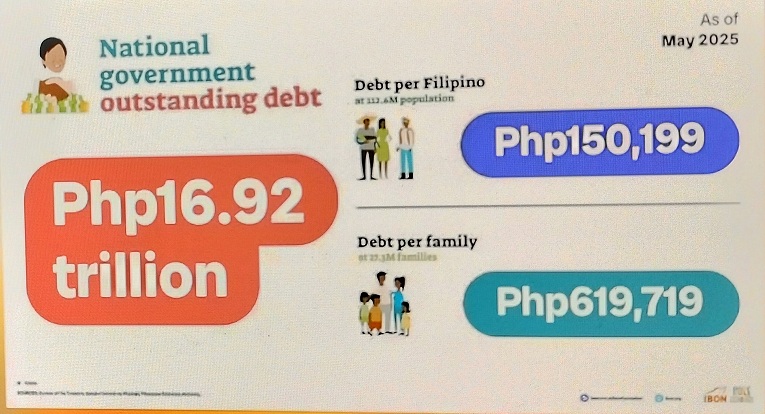
Talking about incomes, Guzman said only 2% of families (roughly 500, 000) have an income of ₱500,000 to more than ₱10 million per month, while 66% (roughly 17 million) families earn below ₱26, 000 per month.
The allocations of the ₱6.326-trillion national budget are indicative of the government’s priorities. Guzman’s chart shows that 17.2% went to the Department of Public Works and Highways,13.4% to debt-service interest, and 12.4% to the Department of Education. On the other hand, funds for the Department of Agrarian Reform and Department of Trade and Industry were at 0.2% each, and 0.5% for the Department of Labor and Employment.
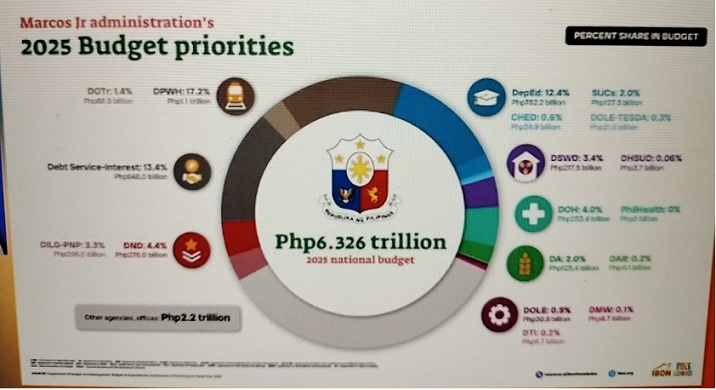
National development
Despite their grim prognosis, Africa and Guzman believe that Filipinos can aspire for development and actually move towards it. Africa said it begins with upholding the national interest and shedding the mindset that only industrialized nations can rule.
“The problem with the Philippines is it’s caught up with its neoliberal policies and the mindset that it won’t survive without industrialized nations, shackling us to [economic] backwardness,” Africa said.
He admitted that industrialization is difficult and that no agency can achieve it alone. He said this is why it’s important that long-term industrial projects are carefully planned, so that these will contribute to national progress through job creation and science development.
He placed the responsibility squarely on the government’s shoulders, saying: “They were caught up in textbook economics and gave up on the markets that could have been developed.”
Africa asserted that the only viable strategies for the Philippines amid the major global changes are national industrialization, agrarian reform and rural development (protectionism, investment regulation, and government support), universal social services (free public health and education, affordable public housing, and universal social protection), and domestic revenue generation (billionaire wealth tax, higher taxes on rich and large corporations, and tax cuts for the poor and middle class).
“We must have control over our economy and work with what we have,” he declared. “We can control things and generate technology within our borders.”
Guzman said Filipinos can achieve the change they need and want: “We can go far because of the citizenry we have.”
